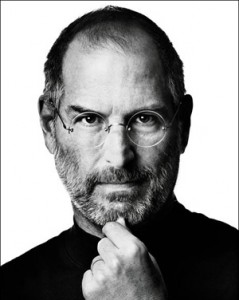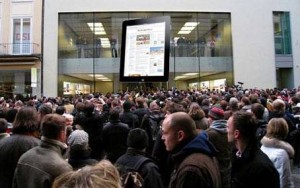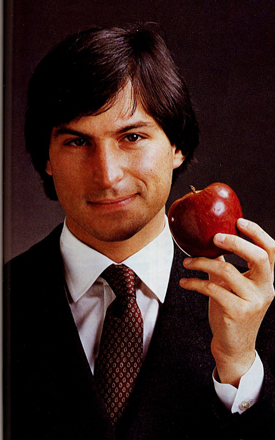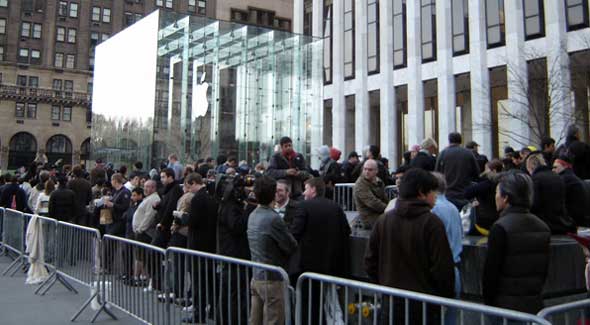 When I learned that Steve Jobs had died, my thoughts went immediately to Charles Shultz. Like Jobs, he was a workaholic (Shultz took only one vacation in 50 years, to celebrate his 75th birthday). Like Jobs, Shultz had an obsession with details (he refused to hire an inker or a letterer, until Parkinson’s made his handwriting too shaky). And Shultz died on February 12, 2000, the day before his final Peanuts strip ran. Steve lived just long enough to see his successor deliver his first keynote, and perhaps conduct one final interview with his biographer (the book will be released on November 21).
When I learned that Steve Jobs had died, my thoughts went immediately to Charles Shultz. Like Jobs, he was a workaholic (Shultz took only one vacation in 50 years, to celebrate his 75th birthday). Like Jobs, Shultz had an obsession with details (he refused to hire an inker or a letterer, until Parkinson’s made his handwriting too shaky). And Shultz died on February 12, 2000, the day before his final Peanuts strip ran. Steve lived just long enough to see his successor deliver his first keynote, and perhaps conduct one final interview with his biographer (the book will be released on November 21).
Some folks in the tech press viewed yesterday’s iPhone 4S announcement as a disappointment. But if that’s true, then it’s an awesome testament to just how far Steve had raised the bar. Poor Tim Cook got up there and demonstrated Suri, a new voice recognizing “personal assistant.” You ask it to remind you to buy milk when you arrived at the grocery store, and it WILL. You ask it for good burger joints in the neighborhood, and it will FIND THEM. You can now have a conversation with your phone, which used to be something that only Tony Stark could do.
Tim Cook announced this, plus a processor seven times as fast as the iPhone 4 and a camera with twice as many pixels. And immediately, Apple’s stock tanked. This is what Steve Jobs accomplished; he blew our minds so many times that we came to EXPECT mind-blowingness. It was no longer enough to have a phone that could take dictation and shoot high definition video. People expected a phone that could bend the very fabric of space-time itself. A part of me wonders if Steve Jobs lived, would he have been able to keep meeting the insane expectations people had for him? How many rabbits can one man pull out of his iHat?
Let’s not forget that in addition to all the Apple stuff, Jobs was CEO of Pixar during the Toy Story days. Un-freaking-believable.

A line outside an Apple store. This happens ALL THE TIME.
Of course, Apple products are about way more than the technology, the same way a BMW is about more than its spec sheet. They are objects of desire. They are personal statements. Think about all those recent graduates who can barely afford ramen, but still wouldn’t be caught dead using a PC. Apple products have an aura that’s every bit as carefully engineered as their aircraft-grade aluminum casings. Steve could take credit for that. He had a vision of what he wanted Apple to be, and he injected that spirit into every aspect of the business. He oversaw the software. He oversaw the hardware. He even made sure the packaging was special. (Man, Apple made some gorgeous packaging over the years.) He would send everything back again and again until it was perfect. As Mr. Wrather pointed out to me this evening, “You had the sense as a consumer that God’s in his heaven and all’s right with the world. Love him or hate him, Jobs had his hand on the wheel.”
And let’s not forget those audacious ads the company produced! I’m sure that most of Steve’s obituaries are going to quote the famous 1997 “Think Different” commercial: “Here’s to the crazy ones. The misfits. The rebels.” It debuted shortly after Jobs returned to the company he co-founded, after a 12 year hiatus. Jobs helped to write the text, and picked images of his personal heroes to accompany it. Bob Dylan. Jim Henson. Thomas Edison.
Here’s the thing about that ad: it’s unbelievably douchy. This is a COMPUTER ad that doesn’t say a thing about the product and instead shows stock footage of Martin Luther King Jr. and Mahatma Gandhi. Freaking GANDHI. Can you imagine any other company in the world using those two men’s images to sell a product and getting away with it?
But people LOVED that ad! Hell, I love that ad too! I just watched it twice and got a little misty-eyed! It should not work, but it does.
And that, my friends, is the Reality Distortion Field. The term was coined in 1981 (30 years ago!) to describe Jobs, and it’s dead on. Because let’s face it: the iPhone, at the end of the day, is just a phone. But you wouldn’t know that from the people who waited in line for days to get one. I sympathize with every other technology company out there. They can try (and even succeed) at making better technology than Apple, but they can’t design anything people will shower with as much love. Under Steve Jobs, Apple designed legitimately amazing things, but his greatest skill was making people feel those products were even MORE amazing. Even if you’re an Apple hater, you have to admire the man’s ability to sell a product, the way you admire Harold Hill even if he isn’t the bandleader he says he is.

The platonic ideal of the CEO.
But here’s what I’ll miss most about Steve Jobs. Quickly, how many CEOs do you actually admire and like? How many CEOs do you think are cool? ANY? In an age where CEOs are mostly in the news for their oversized golden parachutes, here was a guy who made millions of people want MBAs. He was smart, he was talented, and even in a culture that loves to sneer at its heroes, he was never the bad guy. (Yes, you can quibble all you want about Apple’s totalitarian lockdown of the App Store, but no matter how greedy and authoritarian Steve Jobs may have been, the public loved him.) There are lots of talented CEOs in the world, but Jobs was our greatest celebrity CEO. And with the American economy on shaky ground, we could certainly use more of him. We want kids to look up to entrepreneurs and business leaders, and without Steve, I’m not sure who’s left.
I learned that Steve Jobs was dead on my iPhone tonight. Then I came home to write about it on my MacBook. I’m never owned a computer that didn’t come from Apple, starting with my IIc, and I doubt I ever will. It makes me happy to use Apple products. They’re user-friendly, elegant, and cool. Like Charles Shultz, Steve Jobs lived for his work, and poured himself into every detail of his creations. He may be gone, but every time I hear that warm startup chime, his Reality Distortion Field will be in full effect.

Moving tribute to a colossus. I can’t get over how young he was. Part of me hopes he made arrangements with Alcor.
Hilarious that all the negative reaction to the new iPhone is all about the name. If they’d called it 5, the awestruck apes would be reaching for its monolith once more.
Interesting point made here: http://waxy.org/2011/10/apples_1987_knowledge_navigator_only_one_month_late/
“In 1987, Apple released this concept video for Knowledge Navigator, a voice-based assistant combined with a touchscreen tablet computer.
“Based on the dates mentioned in the Knowledge Navigator video, it takes place on September 16, 2011. The date on the professor’s calendar is September 16, and he’s looking for a 2006 paper written “about five years ago,” setting the year as 2011.
“And this morning, at the iPhone keynote, Apple announced Siri, a natural language-based voice assistant, would be built into iOS 5 and a core part of the new iPhone 4S.
“So, 24 years ago, Apple predicted a complex natural-language voice assistant built into a touchscreen Apple device, and was less than a month off.”
I saw that Knowledge Navigator movie, and it’s eerie! I was actually going to mention it in the article. However, it turns out Steve Jobs had zero involvement in that project. It dates from the period when he was kicked out of the company. Which is too bad, because it would be true poetic justice if Steve Jobs had commissioned this concept video in 1987, and he lived just long enough to see the voice recognition thing come true, exactly on schedule.
But perhaps it’s STILL poetic justice that the guy who kicked him out of Apple dreamed up this Knowledge Navigator product for 24 years in the future, and Steve Jobs got his revenge by returning to the company and pretty much MAKING the damn thing.
He was already out in 1987? Wow, nice attention to detail then, earning the site its name once more.
this is the original version of that video, with jobs voice.
http://www.youtube.com/watch?feature=player_embedded&v=8rwsuXHA7RA
Moments like this make me really wonder about the future of humanity. Your elegy is excellent, as is the one at AVClub. But there’s also the comment threads and the Twitter sniping and Facebook naysayers who have finally found the perfect time to loudly proclaim that Macs suck. Knee-jerk antipathy like this is indefensible and rude no matter who has just passed.
My suspicion is that anyone who knows anything about Steve Jobs will understand what he has done, and why his passing is unfortunate. Even if his one and only accomplishment was walking into Xerox PARC and saying “Wow!”, we would still owe our livelihoods to him. Sadly, not everyone knows what Xerox PARC is, or what it had to do with anything. Too many of us these days are able to transition effortlessly from Steve Jobs to Apple to My iPod Broke to Macs Suck to Steve Jobs Sucks.
Alas, that sort of thinking may also be one of Steve Jobs’ legacies. After all, his innovations and marketing genius have put incredibly powerful technologies at our fingertips, without thinking too deeply on what we might do with them. Ironically, that’s what is so great about computers – you have the tools to do things no single engineer(ing team) could ever anticipate. But with great power comes great responsibility – in theory. We’ve been in such a rush to create the next big consumer product (to keep up with Jobs!) that we never stopped to consider the responsibility.
I truly, deeply, respect that man and everything he has accomplished. And I love my computer and everything I can do with it, even though it isn’t a Mac. But I still wonder – what have we done?
It sounds like all those internet trolls have got you down. Ignore them. I promise you, computers have made the world a better place. Any technology is going to be squandered and misused by some people, but technology in general is a good thing!
I actually thought that John Perich’s twitter comment about Jobs being basically a real-life Ayn Rand hero was dead on, and something I’ve often thought myself – even more interesting in light of the fact that, as Matt Yglesias noted, he died with a smaller fotune than any of his peers at Microsoft or Google. He had a confidence that he knew better what would sell than the media’s market analysts, and more often than not he was right.
I’m personally not a Mac fan (I somehow got the one lemon iBook in 2004), but now’s not the time to be a hater.
Yay! I got quoted!
Post in question: http://twitter.com/#!/perich/status/121787195584561152
(Disclaimer: my Twitter posts aren’t always OTI quality)
He also helped out the Cherokee Nation by having the Cherokee Syllabary be native to the iPod and other i-things, greatly helping out native literacy and language preservation :)!
I made this little video using Apple tools alone, and with a bit of help from Mr. Jobs himself. I hope it speaks for itself…
http://www.youtube.com/watch?v=lFs1T1LWFCE